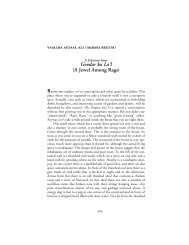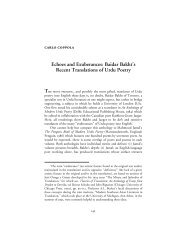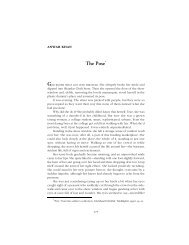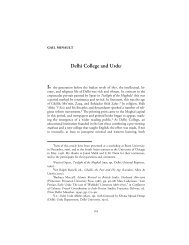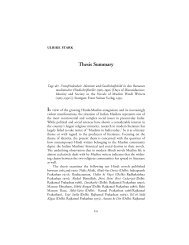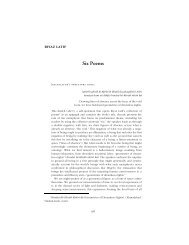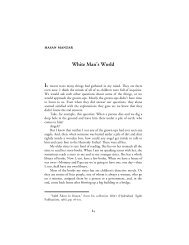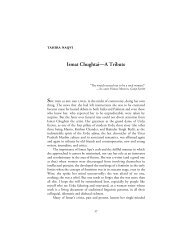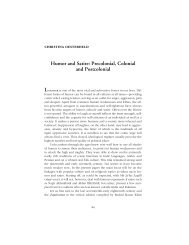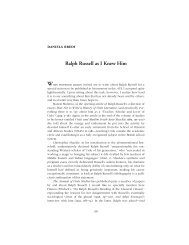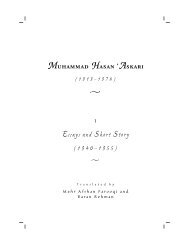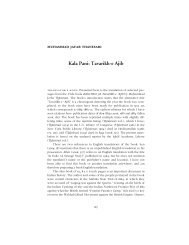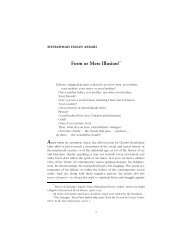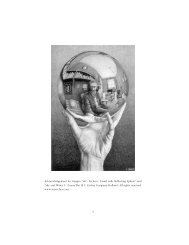Politics, Public Issues and the Promotion of Urdu Literature: Avadh ...
Politics, Public Issues and the Promotion of Urdu Literature: Avadh ...
Politics, Public Issues and the Promotion of Urdu Literature: Avadh ...
Create successful ePaper yourself
Turn your PDF publications into a flip-book with our unique Google optimized e-Paper software.
78 • THE ANNUAL OF URDU STUDIESportion <strong>of</strong> <strong>the</strong> domestic <strong>and</strong> foreign news was also reprinted from Englishnewspapers, particularly The Times <strong>of</strong> London, The Pioneer <strong>of</strong> Allahabad<strong>and</strong> <strong>the</strong> Friend <strong>of</strong> India. For news items regarding <strong>the</strong> Islamic world AAfrequently made use <strong>of</strong> Persian <strong>and</strong> Arabic newspapers. At <strong>the</strong> same time,generating news <strong>and</strong> information was turned into a public, collective concernin which <strong>the</strong> participation <strong>of</strong> <strong>the</strong> readership was explicitly invited:Those who would regularly supply <strong>the</strong> paper with “important, recent,reliable <strong>and</strong> interesting news items” 30 were promised free copies <strong>of</strong> AA inreturn.While introducing new concepts <strong>of</strong> modern informational culture,AA retained some features <strong>of</strong> <strong>the</strong> traditional newsletter as described byMichael H. Fisher. 31 For one, <strong>the</strong>re was <strong>the</strong> physical appearance <strong>of</strong> <strong>the</strong>h<strong>and</strong>written <strong>and</strong> lithographed sheets. The paper retained <strong>the</strong> term“akhb≥r≥t” for various categories <strong>of</strong> news; it adopted a Persianizedvocabulary <strong>and</strong> cultivated a fairly ornate style. Published in two parts, onWednesday <strong>and</strong> Friday, a typical issue <strong>of</strong> <strong>the</strong> paper in 1871 combined elements<strong>of</strong> traditional <strong>and</strong> modern newswriting in its st<strong>and</strong>ard departments.In <strong>the</strong> following overview <strong>of</strong> its contents <strong>the</strong> original <strong>Urdu</strong> has beenretained to show how this intermingling <strong>of</strong> <strong>the</strong> traditional <strong>and</strong> <strong>the</strong>modern was reflected in <strong>the</strong> vocabulary used to label <strong>the</strong> various headings:<strong>Avadh</strong> Akhbar in 1871Part One ([issued] on Wednesday) Part Two ([issued] on Friday)1) General advertisements1) Lucknow(ishtih≥r≥t ma‘m∑lµ)2) Poetry (na m) 2) Telegraph news (akhb≥r≥t tar-barqµ)3) Letters to <strong>the</strong> Editor (khaπ-kit≥bat) 3) Editorial (a≈µªåriyal)4) Proceedings <strong>of</strong> <strong>the</strong> Committee, 324) Correspondent (k≥rasp≥n≈anª)etc. (ma¤≥mµn kamiªµ vaghairah)5) Telegraph news (akhb≥r≥t t≥r-barqµ) 5) Translations from <strong>the</strong> English(tarjuma angr®zµ)6) Editorial (a≈µªåriyal) 6) Reprints from o<strong>the</strong>r papers (manq∑l≥t)7) Correspondent (k≥rasp≥n≈anª) 7) Letters to <strong>the</strong> Editor (khaπ-kit≥bat)30 Fihrist-e Kutub 1879, p. 4.31 Michael H. Fisher, “The Office <strong>of</strong> Akhb≥r Nawµs: The Transition fromMughal to British Forms,” Modern Asian Studies, Vol. 27, No. 1 (1993), pp.79–81.32 I.e., <strong>the</strong> Lucknow Municipal Committee.



